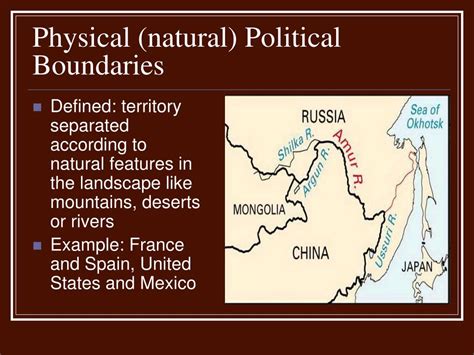Political boundaries are invisible lines that demarcate the territorial limits of nation-states, states, provinces, municipalities, and other political entities. These boundaries are established through treaties, laws, or other formal agreements between governments. They play a crucial role in defining the scope of political authority, administering governance, and resolving territorial disputes.

Purpose of Political Boundaries
Political boundaries serve several essential purposes:
- Defines Territorial Sovereignty: They establish the exclusive jurisdiction of governments over their respective territories, preventing conflicts and maintaining order.
- Facilitates Governance: Boundaries facilitate efficient administration by dividing territories into manageable units for political representation, service delivery, and resource allocation.
- Resolves Territorial Disputes: Political boundaries provide a framework for negotiating and settling disputes over territorial claims between neighboring jurisdictions.
- Promotes Cooperation and Trade: Boundaries can foster cooperation between adjacent regions and facilitate cross-border trade and cultural exchange.
Types of Political Boundaries
There are various types of political boundaries, classified based on their characteristics:
- Natural Boundaries: These boundaries coincide with physical features such as rivers, mountains, or deserts. They often provide natural barriers between regions and facilitate defense.
- Geometric Boundaries: These boundaries are drawn as straight lines or arcs and often divide territories along latitude or longitude lines. They are common in landlocked areas or when precise demarcation is required.
- Cultural Boundaries: These boundaries reflect differences in language, religion, ethnicity, or customs and may coincide with historical or traditional divisions.
- Administrative Boundaries: These boundaries delineate the limits of administrative units within a country, such as states, provinces, or counties. They are essential for local governance and resource management.
Importance of Political Boundaries
Political boundaries have profound geopolitical and socioeconomic implications:
- International Relations: Boundaries influence diplomatic relations between countries and can be a source of conflict or cooperation depending on their stability and legitimacy.
- Security and Defense: Boundaries provide a basis for territorial defense, protect national interests, and prevent military incursions.
- Economic Development: Boundaries affect trade, investment, and economic integration by influencing access to resources, markets, and labor.
- Social and Cultural Identity: Boundaries shape national identity, heritage, and cultural practices by delineating distinct regions and communities.
Challenges and Controversies
Political boundaries are not always static or universally accepted. They can become sources of conflict due to:
- Historical Disputes: Boundaries established through conquest or imperialism may trigger ongoing territorial claims or tensions.
- Ethno-linguistic Differences: Boundaries that divide ethnic or linguistic groups can lead to separatist movements or political instability.
- Environmental Concerns: Boundaries may intersect with sensitive ecosystems, creating challenges for conservation and cross-border cooperation.
- Changing Geopolitics: The emergence of new global powers or regional conflicts can alter the balance of power and lead to boundary revisions.
Establishing and Maintaining Political Boundaries
Establishing and maintaining political boundaries involves complex processes:
- Negotiation and Treaties: Boundaries are often determined through negotiations between governments resulting in treaties, accords, or agreements.
- Surveys and Demarcation: Precise boundaries are established through surveys, mapping, and the placement of physical markers such as boundary stones or fences.
- International Recognition and Monitoring: The legitimacy of boundaries is enhanced by international recognition and monitoring by organizations like the United Nations.
- Border Control and Enforcement: Governments enforce boundary regulations to prevent illegal crossings, smuggling, and other cross-border activities.
Case Studies
European Union and Schengen Area: The European Union has abolished internal boundaries to facilitate free movement of people, goods, and services within its member states. However, the EU also maintains external boundaries to regulate immigration and secure its borders.
United States-Mexico Border: The US-Mexico border has been a source of ongoing controversy, particularly with regard to undocumented immigration, drug trafficking, and border security.
Israel-Palestine Conflict: The dispute over the boundaries of Israel and Palestine has been a major obstacle to peace in the Middle East for decades.
Antarctica: The Antarctic Treaty System establishes Antarctica as a scientific preserve and prohibits any boundary claims or military activity.
Emerging Trends and Technologies
Advancements in technology are shaping the future of political boundaries:
- Geospatial Data and Remote Sensing: Satellite imagery and aerial surveys provide increasingly accurate data for boundary surveys and demarcation.
- Virtual Boundaries: Digital technologies are enabling the creation of virtual boundaries for surveillance, control, and resource management.
- Blockchain and Smart Borders: Blockchain technology has the potential to enhance border security, streamline border crossings, and improve data sharing.
Conclusion
Political boundaries are essential tools for governance, geopolitics, and territorial administration. They define sovereignty, facilitate governance, resolve disputes, and impact a wide range of socioeconomic and security issues. As technology evolves and geopolitical dynamics shift, political boundaries will continue to play a crucial role in shaping the global landscape.
